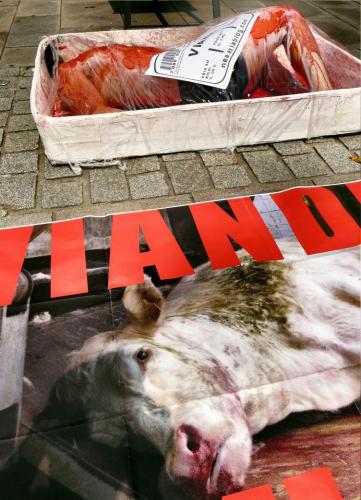

St Thomas (US Virgin Islands), 19-09-2015
Petitioning Carlos Robles Appointed Agriculture Commissioner of Virgin Islands and Governor Kenneth Mapp
Shut down the slaughterhouses in the US Virgin Islands
Abigail Cyntje St Thomas, U.S. Virgin Islands
Our fellow non-human earthlings desperately need us to act against their continuous pain and suffering at the hands of a meat-eating society. Meat consumption causes more suffering and death than any other human activity and is completely unnecessary.It is estimated that every year 1,000-billion aquatic animals are killed worldwide. That's 1,902,588 every minute or 31,710 every second. And, even worse, it's estimated that each year 64-billion land animals are killed worldwide for the appetite of humans. (Or 121,766 every minute and 2,029 every second).
It's time to state clearly the necessity to abolish non-human slavery, and oppose the practices that exploit, torture, and murder animals. Please sign this petition and speak out on behalf of those who cannot speak for themselves.
The myth of "humane slaughter"
The process of slaughter entails taking an animal's life, most commonly by the slitting of the individual's throat while forcibly held in an upside down position in order to facilitate the draining of the blood prior to skinning and dismemberment.
According to the American Heritage Dictionary, the definition of "Humane" includes such words as compassionate and merciful.
To have one's throat involuntarily slit may be many things, but few on the receiving end of such an act would be likely to call it merciful, or compassionate. Hence, humane slaughter is an oxymoron.
Animals do not 'give' their life to us, as the sugar-coated lie would have it. They struggle and fight to the last breath, just as we would do if we were in their place.
Animal products these days are sold with a story: the animal was humanely raised, it was cage-free, it was free-ranged, it was pasture-fed, it’s hormone-free. Whatever. Excluded from these stories is the fact that an animal was killed. He or she was a sentient being who didn’t want to die.
The slaughter house is the limbo between life and death within the commercial animal kingdom, the final destination of an animal before it is killed and shipped off in many different directions from packaged meats with a supermarket destination to pharmaceutical facilities and animal food manufacturers. Amy Fitzgerald, a criminology professor at the University of Windsor in Canada, has found a strong correlation between the presence of a large slaughterhouse and high crime rates in U.S. communities.
Indeed, shouldn’t ethical eating be based upon the premise that our bodies can be nourished without having to support physical or psychological abuse, child labor, life-threatening hazards, sexual harassment, human-rights violations, or the very commodification of workers as well as animals? Don’t all beings deserve to be safe? As consumers, we have the power to make a difference. We can demand that human and nonhuman animals alike are not exploited just to put food on our tables.
https://www.change.org/p/carlos-robles-appointed-agriculture-commissione...


